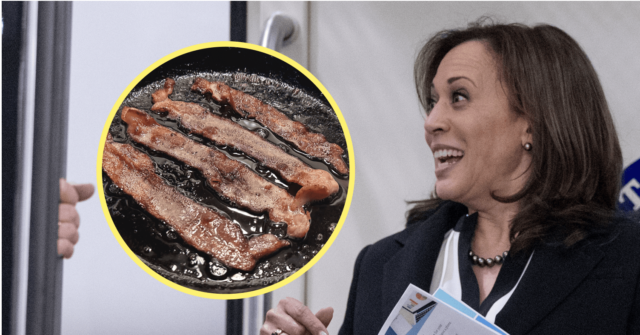The recent decision by the web video series “Subway Takes” not to air an interview with Vice President Kamala Harris has sparked conversations surrounding cultural sensitivity and political engagement. Host Kareem Rahma, a Muslim who does not consume pork for religious reasons, found himself in an awkward position when the vice president insisted her interview segment focus on the “joys of bacon.” Rahma’s initial intention was to highlight issues that resonated with his audience, particularly in relation to U.S. policy on the Israel-Hamas conflict and how he believed her views aligned with his own. However, the tone of the interview took an unexpected turn when Harris presented an offbeat perspective, humorously declaring bacon to be a spice.
This incident, which was reported by Reggie Ugwu of The New York Times, sheds light on the clash between Rahma’s expectations and Harris’s approach during their conversation. Initially, Rahma believed he would engage Harris on a serious topic concerning airplane regulations about removing shoes, only to find Harris pivoting to an amusing commentary on bacon. This misalignment exemplified a disconnect between the political environment and the cultural sensibilities of the host, leading to an uncomfortable and unproductive dialogue. The situation escalated when Rahma attempted to redirect the discussion back to a more relevant topic, specifically inquiring about alternative meats like beef and turkey, only to have Harris insist on discussing her affinity for anchovies as an alternate food choice.
The fallout from the interview decision highlights Harris’s ongoing challenges in garnering support from Arab and Muslim American communities. This demographic has shown signs of disengagement from the Democratic Party, with some members considering support for Donald Trump, primarily due to dissatisfaction with current policies and perceived slights from political figures. Harris’s comments during the interview may have further alienated these potential voters, as the humor surrounding bacon did not resonate with an audience sensitive to cultural practices related to food and faith. The fallout from this incident could have broader implications for the Democratic Party’s strategy in connecting with Muslim voters in an increasingly polarized political landscape.
Rahma’s decision to ultimately not air the interview reflects a growing concern within the media about how political figures engage with diverse audiences. He chose to proceed with an episode featuring Minnesota Governor Tim Walz discussing more mundane topics, leaving viewers with the impression that Harris’s approach missed the mark in addressing the nuanced concerns of her audience. The visibility of this incident on platforms like Twitter and news outlets has triggered a debate regarding the appropriateness of political humor in contexts where it may be perceived as dismissive or out of touch.
Looking beyond just the immediate ramifications for both Rahma and Harris, this episode serves as a microcosm of the broader challenges faced by politicians as they strive to communicate effectively across cultural divides. The expectations of authenticity and understanding in conversations between political figures and the communities they seek to represent are particularly high. Missteps, such as Harris’s comments about bacon, can lead to significant backlash and disillusionment among voters who feel that their issues are not being taken seriously. This incident underscores the need for greater awareness and sensitivity in political discourse, particularly in an era where cultural representation and acknowledgment play critical roles in electoral success.
As this dialogue unfolds, both Rahma’s and Harris’s responses to the incident will likely continue to be scrutinized. For Rahma, the decision to withhold the aired conversation may serve as a precedent for future interactions with political figures, while for Harris, the necessity of bridging gaps between her administration’s policies and the demands of diverse constituents becomes ever more pressing. The consequences of this exchange potentially extend well beyond the immediate context, as they could influence voter sentiment leading up to upcoming elections. The interplay of culture, humor, and political dialogue remains a vital area for exploration, especially as it pertains to the inclusivity and responsiveness of political messaging.

